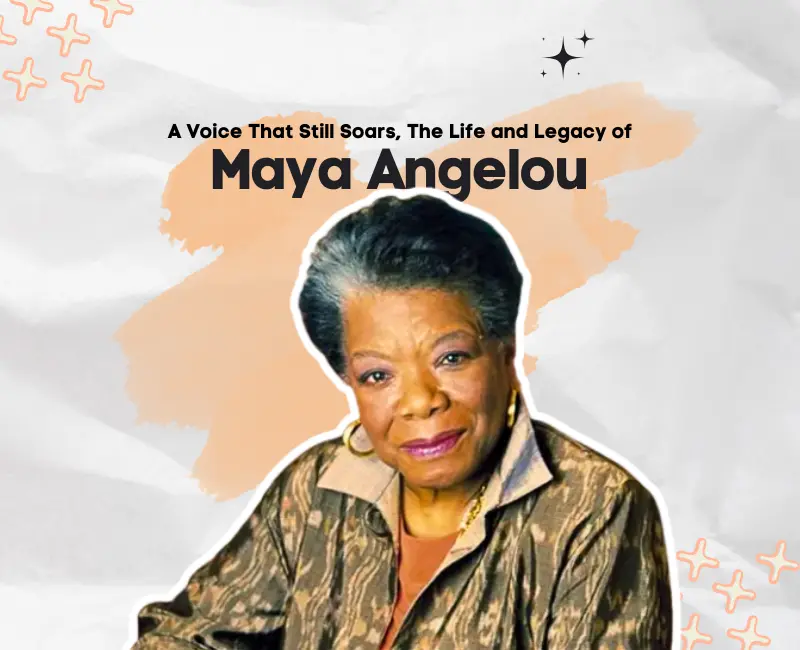The Life and Legacy of Maya Angelou: A Voice That Still Soars

“I am the dream and the hope of the slave. I rise. I rise. I rise.” These powerful words from Maya Angelou’s poem ‘Still I Rise’ have echoed across decades, fueling movements, lifting spirits, and reminding the world of the unbreakable strength within us all. For those who have faced oppression, doubted their worth, or searched for courage in a storm, Angelou’s words have been a lifeline as a poetic anthem of resilience and triumph.
But who was the woman behind these transformative lines? What shaped her wisdom, her artistry, and her unwavering belief in the human spirit? To truly understand the power of Angelou’s words, we must explore the life she lived. A life filled with struggle, creativity, and an enduring commitment to justice. This is the story of Maya Angelou, a voice that continues to rise and inspire, reminding us all of what is possible when we dare to own our truth.
Childhood and Early Struggles
Maya Angelou’s life story began as Marguerite Annie Johnson on April 4, 1928, in St. Louis, Missouri, Maya Angelou’s early years were anything but easy. Her parents’ tumultuous relationship resulted in her and her brother Bailey Jr. being sent to live with their paternal grandmother in Stamps, Arkansas. Life in the segregated South exposed Angelou to the harsh realities of racism and inequality, experiences that would later become recurring themes in her work.
At the tender age of eight, Angelou’s life took a traumatic turn when she was sexually assaulted by her mother’s boyfriend. The aftermath of this incident led to the man’s death and Angelou’s subsequent vow of silence for nearly five years. Believing her words had caused his death, she stopped speaking altogether, retreating into the sanctuary of books and literature.
It was during this period of silence that Angelou developed a profound love for language. She read voraciously, Shakespeare, Edgar Allan Poe, Black poets like Paul Laurence Dunbar, and began to understand the transformative power of storytelling. Little did she know, her own words would one day transform lives around the world.
A Multidimensional Career
If Maya Angelou’s life could be summed up in one word, the word “versatile” suits the best. Over her long and illustrious career, she wore many hats: a dancer, singer, actress, playwright, director, civil rights activist, teacher, and, of course, a prolific writer. Each role she played enriched her perspective and informed her creative output.
A Performer First
In her late teens and early twenties, Angelou pursued a career as a performer. She toured Europe and Africa as a singer and dancer, using her magnetic stage presence to captivate audiences. Her voice, rich, resonant, and soulful, landed her gigs as a calypso singer, even leading to the release of her album “Calypso Lady’. Around this time, she adopted the stage name “Maya Angelou,” combining her brother Bailey’s nickname for her, “Maya,” which meant “My” or “Mya Sister”, with her married surname, “Angelou.”
She also danced professionally, appearing in Broadway and off-Broadway productions. Her grace and poise earned her roles in films, including Porgy and Bess and Calypso Heat Wave. Yet, as she continued to evolve as an artist, it became clear that her most significant contributions would be through her pen rather than her feet.
A Global Citizen and Activist
Angelou’s wanderlust took her to Ghana in the early 1960s, where she worked as a teacher, writer, and editor. Living abroad deepened her understanding of African heritage and inspired her activism. She became involved in the civil rights movement, working alongside generational revolutionary minds like Malcolm X and Dr. Martin Luther King Jr.
Her activism was rooted in her belief in equality and justice. While in Ghana, she connected with pan-Africanist ideas, further solidifying her commitment to uplifting marginalized communities. Returning to the United States, Angelou served as the Northern Coordinator for the Southern Christian Leadership Conference, an organization founded by Dr. King. Her work as an activist cemented her reputation as a fearless advocate for social change.
The Breakthrough: I Know Why the Caged Bird Sings
Maya Angelou’s breakout moment as a writer came in 1969 with the publication of her first autobiography, ‘I Know Why the Caged Bird Sings’. This Maya Angelou autobiography was revolutionary for its unflinching honesty, tackling subjects like racism, identity, and trauma. In the memoir, Angelou recounted her childhood in the segregated South, her experiences with sexual assault, and her journey toward self-discovery. This groundbreaking work not only cemented her place in literary history but also became one of the most famous works of Maya Angelou.
The book’s title, inspired by Paul Laurence Dunbar’s poem “Sympathy,” captures the longing for freedom and expression that defined much of Angelou’s life. I Know Why the Caged Bird Sings became a critical and commercial success, making Angelou the first African American woman to have a nonfiction bestseller.
The memoir’s unflinching honesty challenged societal norms, especially regarding topics like sexual violence and systemic racism. Despite facing bans and controversy, it has become a cornerstone of modern literature, studied in classrooms and cherished by readers worldwide till date.
The Power of Poetry
Angelou’s poetry is another jewel in her creative crown. Her verses are infused with rhythm, emotion, and an unwavering commitment to truth. Poems like “Still I Rise” and “Phenomenal Woman” celebrate the indomitable spirit of Black women, while others address universal themes of love, loss, and hope. To properly grasp the marvel of her work, Angelou’s poetry collection, ‘The Complete Collected Poems of Maya Angelou’, offers readers a comprehensive look at her lyrical genius. Spanning themes of love, injustice, and hope, it showcases why her voice remains timeless.
When discussing Maya Angelou poems, ‘On the Pulse of Morning’, performed at President Clinton’s 1993 inauguration, remains unforgettable as it introduced her poetry to a global audience. The poem, which emphasized unity and progress, resonated deeply with the American public. Angelou’s commanding delivery, coupled with her heartfelt words, demonstrated the unique power of spoken-word poetry further cementing her inspirational place in the field.
A Legacy of Memoirs
After the success of I Know Why the Caged Bird Sings, Angelou continued to write autobiographies, creating a series that spanned her life’s journey. Each memoir offered a new perspective on her experiences and growth. Titles like ‘Gather Together in My Name’ and ‘The Heart of a Woman’ explored her struggles as a single mother, her time in Africa, and her activism during the civil rights era.
Angelou’s memoirs are remarkable for their ability to blend personal narrative with historical context. She painted vivid pictures of the people she met and the places she traveled, from the jazz clubs of Harlem to the bustling streets of Accra. Her storytelling transported readers, inviting them to walk alongside her as she navigated life’s complexities.
Her Impact on Society
Maya Angelou’s influence extended far beyond the literary world. She was a role model, a cultural icon, and a voice for the voiceless. Her work has inspired countless individuals to embrace their identities and speak their truths.
Championing Representation
At a time when Black women’s voices were often silenced or marginalized, Angelou broke barriers. She unapologetically celebrated her heritage and uplifted the experiences of Black communities. Her work opened doors for future generations of writers, performers, and activists, proving that diverse stories have immense value.
Advocating for Education
Angelou believed deeply in the transformative power of education. She often spoke about the importance of reading and learning, encouraging young people to pursue knowledge as a tool for empowerment. Her speeches and interviews are filled with nuggets of wisdom, urging audiences to be curious, compassionate, and courageous.
Maya Angelou’s Philosophies on Life
What made Maya Angelou truly extraordinary was her ability to distill complex truths into simple, poignant wisdom. Her quotes continue to circulate widely, offering guidance and inspiration.
One of her most famous sayings, “When someone shows you who they are, believe them the first time,” is a testament to her sharp understanding of human nature. Her advice to “be a rainbow in someone else’s cloud” reminds us of the importance of kindness and empathy.
Angelou also emphasized resilience, famously declaring, “I can be changed by what happens to me, but I refuse to be reduced by it.” This philosophy underpinned her entire life, enabling her to overcome obstacles and rise above adversity.
Honors and Recognition
Over the course of her life, Angelou received numerous accolades. She was awarded over 50 honorary degrees, recognizing her contributions to literature, education, and activism. In 2010, President Barack Obama presented her with the Presidential Medal of Freedom, the nation’s highest civilian honor.
Angelou’s work has been celebrated across generations and cultures, cementing her status as a global icon. Her books, poems, and speeches remain as relevant today as they were decades ago, continuing to inspire readers of all backgrounds.
A Timeless Legacy
Maya Angelou passed away on May 28, 2014, at the age of 86. Yet, her voice lives on through her words, her teachings, and the countless lives she touched. She taught us that storytelling is an act of courage, that poetry can heal, and that every person has the power to rise above their circumstances.
Her legacy is not just in the books she wrote or the speeches she gave but in the spirit she embodied of resilience and grace for those who find themselves lost in life’s trials, Maya Angelou’s legacy serves as a lighthouse, guiding them back to hope and purpose.
Conclusion
Maya Angelou was a woman of many roles, an artist, activist, teacher, and trailblazer. But above all, she was a storyteller, one whose words have etched themselves into the hearts of millions. Her life was a testament to the beauty of resilience and the transformative power of self-expression.
As we reflect on her remarkable journey, let us remember her not only for the incredible body of work she left behind but also for the values she embodied of courage, empathy, and the unyielding belief in the potential of every individual.
Her words continue to echo, reminding us that no matter how caged we may feel, our spirits have the capacity to soar. And as we face our own struggles, we can take solace in knowing that, like Maya Angelou, we too can rise.


